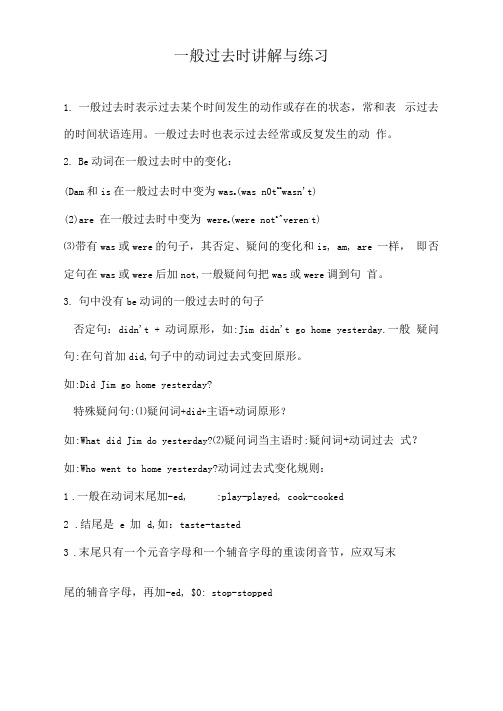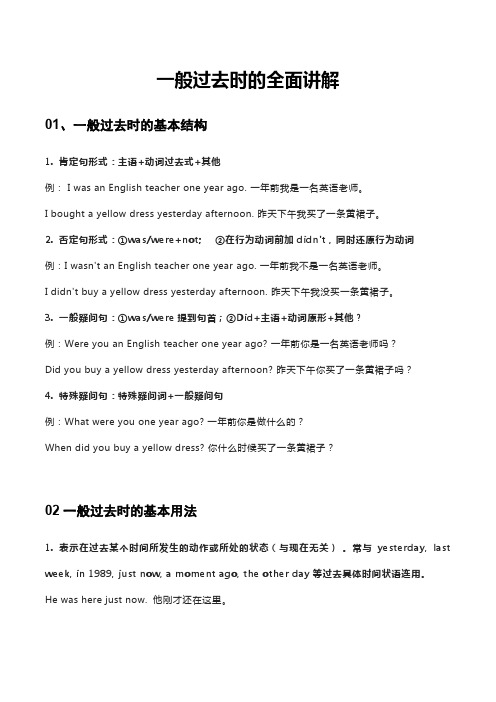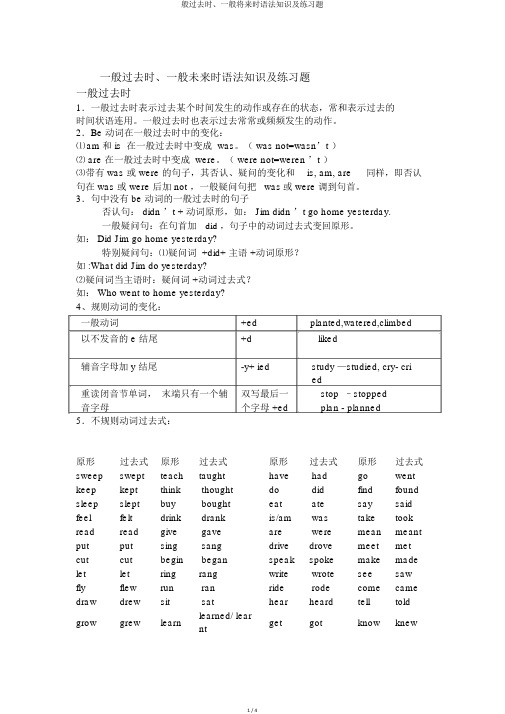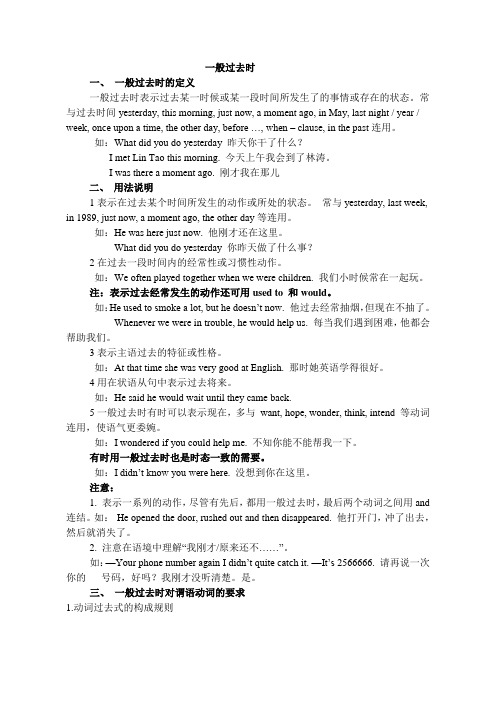最新一般过去时讲解与练习资料
- 格式:docx
- 大小:35.50 KB
- 文档页数:11

一般过去时1)在确定的过去时间里所发生的动作或存在的状态。
时间状语有:yesterday, an hour ago, the other day, ,yesterday morning (afternoon, evening), last night (week, month, year…), a moment ago , a week ago, three years ago… just now,in the past等。
Where did you go just now?2)谓语动词形式为动词的过去式,一般在动词原形后加-ed,I was tired last night,昨天晚上我很累。
We visited the museum yesterday.昨天我们参观了那个博物馆。
二、一般过去时的构成1.was/were+形容词/名词/...如I was at home yesterday.昨天我在家。
Mr.Green was not a teacher last year.去年格林女士不是一个老师。
系动词be的过去式为am,is→was are→were第一人称单数(I)/第三人称单数(he/she/it)+was第二人称单数(you)/各人称复数(we/you/they)+were.2.实义动词的过去式+其他成分My mother went shopping yesterday.我妈妈昨天去购物了。
His uncle worked in Beijing in 2014.他叔叔2014年在北京工作。
三、一般过去时的句式四、动词过去式的变化规则3 used toused to + do:"过去常常"表示过去习惯性的动作或状态,但如今已不存在。
Mother used to take a walk. (过去常常散步)二、构成及变化1. Be动词在一般过去时中的变化:am 和is在一般过去时中变为was。

一般过去时讲解与练习1.一般过去时表示过去某个时间发生的动作或存在的状态,常和表示过去的时间状语连用。
一般过去时也表示过去经常或反复发生的动作。
2.Be动词在一般过去时中的变化:(Dam和is在一般过去时中变为was o(was n0t zz wasn't)(2)are 在一般过去时中变为were o(were not z^veren,t)⑶带有was或were的句子,其否定、疑问的变化和is, am, are 一样,即否定句在was或were后加not,一般疑问句把was或were调到句首。
3.句中没有be动词的一般过去时的句子否定句:didn't + 动词原形,如:Jim didn't go home yesterday.一般疑问句:在句首加did,句子中的动词过去式变回原形。
如:Did Jim go home yesterday?特殊疑问句:⑴疑问词+did+主语+动词原形?如:What did Jim do yesterday?⑵疑问词当主语时:疑问词+动词过去式?如:Who went to home yesterday?动词过去式变化规则:1.一般在动词末尾加-ed, :play-played, cook-cooked2.结尾是 e 加d,如:taste-tasted3.末尾只有一个元音字母和一个辅音字母的重读闭音节,应双写末尾的辅音字母,再加-ed, $0: stop-stopped4.以“辅音字母+y”结尾的,变y为i,再加-ed,如:study-studied5.小学常用不规则动词过去式:am,is-was, are-were, do-did, see-saw, say-said, give-gave, get-got, go- went, come-came, have-had, eat-ate, take-took, run-ran, sing-sang, put- put, make-made, read-read, write-wrote, draw-drew, drink-drank, fly- flew, ride-rode, speak-spoke, sweep-swept, swim-swam, sit-sat一.用be动词的适当形式填空1.We students five years ago.2.Patti and I good friends.3.Today Tuesday, Yesterday Monday.4.Sue on the slide a moment ago.5.Where is my hat? It on the desk just now.2.单项选择:从下列各题后所给的四个选项中选择最佳答案填空。

一般过去时的全面讲解01、一般过去时的基本结构1. 肯定句形式:主语+动词过去式+其他例: I was an English teacher one year ago. 一年前我是一名英语老师。
I bought a yellow dress yesterday afternoon. 昨天下午我买了一条黄裙子。
2. 否定句形式:①was/were+not; ②在行为动词前加didn't,同时还原行为动词例:I wasn't an English teacher one year ago. 一年前我不是一名英语老师。
I didn't buy a yellow dress yesterday afternoon. 昨天下午我没买一条黄裙子。
3. 一般疑问句:①was/were提到句首;②Did+主语+动词原形+其他?例:Were you an English teacher one year ago? 一年前你是一名英语老师吗?Did you buy a yellow dress yesterday afternoon? 昨天下午你买了一条黄裙子吗?4. 特殊疑问句:特殊疑问词+一般疑问句例:What were you one year ago? 一年前你是做什么的?When did you buy a yellow dress? 你什么时候买了一条黄裙子?02一般过去时的基本用法1. 表示在过去某个时间所发生的动作或所处的状态(与现在无关)。
常与yesterday, last week, in 1989, just now, a moment ago, the other day等过去具体时间状语连用。
He was here just now. 他刚才还在这里。
What did you do yesterday? 你昨天做了什么事?2. 在过去一段时间内的经常性或习惯性动作。

一般过去时、一般未来时语法知识及练习题一般过去时1.一般过去时表示过去某个时间发生的动作或存在的状态,常和表示过去的时间状语连用。
一般过去时也表示过去常常或频频发生的动作。
2.Be 动词在一般过去时中的变化:⑴am 和 is 在一般过去时中变成 was。
( was not=wasn’t )⑵ are 在一般过去时中变成 were。
( were not=weren ’t )⑶带有 was 或 were 的句子,其否认、疑问的变化和is, am, are同样,即否认句在 was 或 were 后加 not ,一般疑问句把was或 were 调到句首。
3.句中没有 be 动词的一般过去时的句子否认句: didn ’t + 动词原形,如: Jim didn ’t go home yesterday.一般疑问句:在句首加did ,句子中的动词过去式变回原形。
如: Did Jim go home yesterday?特别疑问句:⑴疑问词 +did+ 主语 +动词原形?如 :What did Jim do yesterday?⑵疑问词当主语时:疑问词 +动词过去式?如: Who went to home yesterday?4、规则动词的变化:一般动词+ed planted,watered,climbed 以不发音的 e 结尾+d liked辅音字母加 y 结尾-y+ ied study —studied, cry- cried重读闭音节单词,末端只有一个辅双写最后一stop –stopped音字母个字母 +ed plan - planned5.不规则动词过去式:原形过去式原形过去式原形过去式原形过去式sweep swept teach taught have had go went keep kept think thought do did find found sleep slept buy bought eat ate say said feel felt drink drank is/am was take took read read give gave are were mean meant put put sing sang drive drove meet met cut cut begin began speak spoke make made let let ring rang write wrote see saw fly flew run ran ride rode come came draw drew sit sat hear heard tell toldgrow grew learn learned/ learget got know knew nt一般过去时练习一、写出以下动词的过去式is\am_________ fly_______ plant________ are ________drink_________ play_______ go________ make ________does_________ dance________ worry________ ask _____taste_________ eat__________ draw________ put ______throw________ kick_________ pass_______ do ________二、用 be 动词的适合形式填空1. _______ you at school just now? No, I _____ .2. He ________ at the camp last week.3. Yang Ling ________ eleven years old last year.4. There ________ an apple on the plate yesterday.5. There ________ some milk in the fridge on Sunday.6. I ______ an English teacher now.7. Helen and Nancy ________ good friends.8. The little dog _____ two years old this year.9. Look, there ________ lots of grapes here.10. Today _____ the second of June. Yesterday ______ the first of June. It _____ Children ’s Day. All the students ______ very excited.11.He _________ (live) in Wuxi two years ago.12.The cat ________ (eat) a bird last night.13.I ________ (make) a model ship with Mike yesterday.14.The girls ________ (sing) and _______ (dance) at the party.15.Her father _______ (read) a newspaper last night.16.______ you _______ (visit) your relatives last Spring Festival?17.______ he _______ (fly) a kite on Sunday? Yes, he ______.18.I ____________ (sweep) the floor yesterday, but my mother ______.19.What ______ she _______ (find) in the garden last morning? She__________ (find) a beautiful butterfly.20. She likes ______ newspapers, but she ______ a book yesterday. (read)21. He _______ football now, but they _______ basketball just now. (play)22. Jim ’s mother _________ (plant) t rees just now.23._______ they ________ (sweep) the floor on Sunday? No, they _____.24.We ___________ (go) to school on Sunday.25.It _____ (be) the 2nd of November yesterday. Mr White ________ (go)to his office by car.26.Gao Shan ________ (put) the book on his head a moment ago.27.Don ’t ______ the house. Mum _______ it yesterday. (clean)28.What ____ you ______ just now? I _______ some housework. (do)29.I want to ______ apples. But my dad _______ all of them last month. (pick)30.The students often _________ (draw) some pictures in the art room.四、一般未来时表示将要发生的动作或存在的状态及打算、计划或准备做某事。

一般过去时一、一般过去时的定义一般过去时表示过去某一时候或某一段时间所发生了的事情或存在的状态。
常与过去时间yesterday, this morning, just now, a moment ago, in May, last night / year / week, once upon a time, the other day, before …, when – clause, in the past连用。
如:What did you do yesterday 昨天你干了什么?I met Lin Tao this morning. 今天上午我会到了林涛。
I was there a moment ago. 刚才我在那儿二、用法说明1表示在过去某个时间所发生的动作或所处的状态。
常与yesterday, last week, in 1989, just now, a moment ago, the other day等连用。
如:He was here just now. 他刚才还在这里。
What did you do yesterday 你昨天做了什么事?2在过去一段时间内的经常性或习惯性动作。
如:We often played together when we were children. 我们小时候常在一起玩。
注:表示过去经常发生的动作还可用used to 和would。
如:He used to smoke a lot, but he doesn’t now. 他过去经常抽烟,但现在不抽了。
Whenever we were in trouble, he would help us. 每当我们遇到困难,他都会帮助我们。
3表示主语过去的特征或性格。
如:At that time she was very good at English. 那时她英语学得很好。
4用在状语从句中表示过去将来。
如:He said he would wait until they came back.5一般过去时有时可以表示现在,多与want, hope, wonder, think, intend 等动词连用,使语气更委婉。

小学英语一般过去时专项讲解、练习和参考答案一般过去时专项讲解与练习一、概念:一般过去时表示过去某一时候发生的动作或存在的状态。
常与一般过去时连用的时间状语有:yesterday; 昨天just now刚才the day before yesterday;前天⋯⋯ago ⋯⋯之前(例如:三天前 three days ago )Last ⋯⋯上一个⋯(例如:上周星期天last Sunday )in 1990在1990年(in+过去时间)二、分类(一) be 动词的一般过去时:肯定句:主语 +be 动词的一般过去时( was/were)否定句:主语+be动词的一般过去时(was/were)+not一般疑问句: be 动词的一般过去时( was/were )+主语(二) there be结构的一般过去时与be 动词的一般过去时的变化基本一致。
(三)一般动词的过去时:肯定句:主语 +动词的过去时( I laughed.)否定句:主语 +did not+ 动词原形( I didn’t laugh.)一般疑问句: Did+主语 +动词原形( Did you laugh?)三.巧记 chant动词一般过去时,表示过去发生事;be 用 was 或用 were, have,has变had;谓语动词过去式,过去时间坐标志;一般动词加 -ed ,若是特殊得硬记。
否定句很简单,主语之后didn ’ t 添;疑问句也不难, did 放在主语前;如果谓语之前有 did ,谓语动词需还原;动词若是 was,were, 否定就把 not 添。
四、习题练习(一)用动词的适当形式填空:1.He ______ (work) in that bank four years ago.2.She ______ (live) in the US last Monday.3.I ______ (see) him yesterday.4.He _______(come) to school at 6 o’clock this morning.5.The boy _______ (have) a bad cold yesterday.6.When _______ you _______ (buy) that house?7.He _______(tell) a story to his daughter yesterday.8._____ you ____ (try) to call me last night?9.What _______you _______ (buy) in the shop?I ______ (buy) a coat just now.10. The doctor ______ (get) up late this morning.11.She ________ (paint) the wall last month.12.My mother _______ (be) a worker 20 years ago.13.________ (be) you here just now?No, I ________ (be not) here.14.Why _______ your brother _______ (cry) last night?15.It ______(be) my mother’s birthday yesterday.(二)翻译下列句子:1.我上周去看爷爷和奶奶了。
一般过去时讲解及练习(一)一般过去时的含义:过去发生的动作,现在已经结束了一般过去时(实义动词类)的句子结构:及时操练:like-__________want-__________shop-__________ study-__________live-__________clean-__________❖及时操练:eg. He ____________ a student ten years ago.(be)改为否定句:改为一般疑问句:肯定回答:否定回答:对ten years ago划线提问:(四)一般过去时的时间标志词1. yesterday昨天系列:yesterday昨天,yesterday morning昨天早上,the day before yesterday 前天2. last上一个系列:last year去年,last month上个月,last week上周3. ago以前系列:two minutes ago两分钟前, three hours ago三小时前, four days ago四天前4. just now刚才(五)一般过去时(be动词类)练习:I. 用所给词的适当形式填空1. I __________ at home just now. (be)2. They __________ happy last week. (be)3. She __________ a student ten years ago. (be)4. The old man __________ at church yesterday. (be)II. 按要求改写句子:1. I was at home just now. (改成否定句)I __________ __________ at home just now.2. They were happy last week. (改成一般疑问句)__________ __________ happy last week?3. She was a student ten years ago. (改成否定句)She __________ __________ a student ten years ago.4. The old man was at church yesterday. (对划线部分提问)__________ __________ the old man at church ?(七)一般过去时(实义动词类)练习:I. 用所给词的适当形式填空1. I _________ (have) an exciting party last weekend.2. _________ she _________(practice) her guitar yesterday? No, she _________.3. What ________ Tom ________ (do) on Saturday evening?He ________(watch) TV and __________(read) an interesting book.4. They all _________(go) to the mountains yesterday morning.5. She _________(not visit) her aunt last weekend.She ________ (stay) at home and _________(do) some cleaning.II. 按要求改写句子1. Lucy did her homework at home.(改否定句)Lucy ________ _______ her homework at home.2. He found some meat in the fridge.(变一般疑问句)___________ he __________ ___________ meat in the fridge?3. They studied English last year.(变一般疑问句)_______ they _______ English last year?4. Frank read an interesting book about history. (一般疑问句)_______ Frank _______ an interesting book about history?5. My family went to the beach last week. (划线提问)________ ________ ________ family _______ last week?。
一般过去时 (讲解+练习+答案)1、基本概念:※ 一般过去时表示过去某个时间或某一段时间里发生的动作或存在的状态,常和表示过去的时间状语连用,如yesterday, last night, in 1990,two days ago,just now(刚才)等。
例如:He got up at 6:30 yesterday.I visited my grandparents last week.※一般过去时也表示过去经常或反复发生的动作,常和often, always等表示频率的时间状语连用。
例如:He always went to school by school bus last year.2、be动词的一般过去时(am、is-was are-were)在没有实义动词的句子中使用be动词, am is 的过去式为was; are的过去式为were。
构成:(1)肯定句:主语+was (were) +表语+其他…I was late yesterday. (我昨天迟到了。
)We were late yesterday.(2)否定句:主语+was (were) +not+表语+其他…I was not late yesterday.We weren't late yesterday. (我们昨天没有迟到)【注意】:当句中含有系动词was,were时,可直接在其后加not构成否定句。
(3)疑问句:Was (Were) +主语+表语+其他…?肯定回答:Yes,主语+was. 否定回答:No,主语+wasn’t.Were you late yesterday? ——Yes, I was./No, I wasn’t.Were they late yesterday? ——Yes,they were./No,they weren’t.特殊疑问句:特殊疑问词+was (were) +主语+表语+其他?What did you do yesterday?3.实义动词的一般过去时(以watch为例)(※一般过去时不需考虑第三人称单数的变化。
一般过去时的概念:一般过去时表示过去某个时间发生的动作或存在的状态。
常和表示过去的时间状语连用,如:last year, yesterday等。
例如:I saw him in the street yesterday. 昨天我在街上看见他了。
一般过去时的结构1、肯定形式:主语+动词过去式+其他例句:She often came to help us in those days.2、否定形式:①was/were+not;②在行为动词前加didn't,同时还原行为动词例句:I didn't know you like coffee.3、一般疑问句:①Did+主语+谓语动词原型+其他?②WasWere+主语+表语?例如:-Did you go to Beijing last week?-Yes, we did. (No, we didn't.)4、一般过去时的特殊疑问句的构成:疑问词+did+主语+动词原形+其它?例如:-What did you do last night?-I did my homework.动词过去式的构成:(1)规则动词过去式的构成有四条规则:①一般在动词原形末尾直接加上-ed。
如:look-looked。
②以不发音的字母e结尾的动词,去e再加-ed。
如:live-lived。
③末尾只有一个辅音字母的重读闭音节(辅元辅结构),先双写这个辅音字母,再加-ed。
如:stop-stopped。
④末尾是辅音字母+y结尾的动词,先变y为i,然后再加-ed。
如:study-studied。
(2)不规则动词的过去式需特殊记忆。
如:am(is)-was, are-were, go-went, come-came, take-took, have (has)-had等。
一般过去时口诀一般过去时并不难,表示过去动作、状态记心间。
动词要用过去式,时间状语句末站。
否定句很简单,didn't 站在动词原形前,其它部分不要变。
亠般过去式(一) 一般过去时的概念 一般过去时用来表示过去某一时间内发生的动作或存在的状态以及过去习惯性、反复性的动作。
谓语动词要用动词的过去式,常和表示过去的时间状语连用, 女口 yesterday 昨天、last night 昨晚、last week 上周、last year 去年,等。
(二) 一般过去时的结构(可分三类不同的结构)1. Be 动词的一般过去时 am is 的过去式为 was; are 的过去式为 were 肯定句式:主语 + was /were+其它.否定句式:主语 + was/were + not + 其它.一般疑问句:was/were+主语+其它?2. 实义动词的一般过去时态 肯定句要使用动词的过去式,否定句和疑问句要使用助动词do 和does 的过去式 did.肯定句式:主语 +动词(过去式)+其它否定句式:主语 + didn 't ( did not ) +动词(原形)+其它一般疑问句:Did +主语+动词(原形)+其它【do , does 的过去时均为did 】? 注:(1) did 和didn '是构成一般过去时的助动词,其特点是要在其后跟动词的原形。
(2 )实意动词do 的一般过去时I do my homework every day.(用 yesterday 改写句子 )I did my homework yesterday.I didn ' t do my homework yesterd 否定句)Did you doyour homework yesterday ? Yes ,1 did. /No, I didn—般疑何句)3. 情态动词的一般过去时态肯定句式:主语 +情态动词+其它否定句式:主语 +情态动词+ not +其它.一般疑问句:情态动词 +主语+其它?注: 情态动词的过去式: can ^could , may 宀might , must must will-would , should-should 。
般过去时一般过去时(simple past tense)表示过去某个时间里发生的动作或状态;过去习惯性、经常性的 动作、行为;主语在过去所具备的能力和性格等。
一、 一般过去时的形式 1.be 动词的一般过去时态的形式有两种,即 was, were 。
「amBe < is 」was :主语是第一、第三人称单数L are ― were :主语是复数,第二人称单、复数2.助动词、情态动词、行为动词 的一般过去时态的形式没有人称和数的变化。
二、 一般过去时的用法1.表示过去某个特定时间发生的动作或存在的状态精品文档这种情况常与 “just now 刚才,yesterday 昨天,last year 去年,in 1999 在 1999 年,two days ago两天之前”等表示过去的时间状语连用。
She sudde nly fell ill yesterday.78 她昨天突然病倒了。
? 一般过去时亦可与用。
如:today 今天,this week 这周,this month这个月,this year 今年 等表示现阶段时间状语连Did you meet him today?2.表示过去的习惯性或经常发生的动作一般过去时表示过去经常或反复发生的动作,常和 的时间状语连用。
"often 经常,always 总是,once a week 一周一次"等表示频度I went to the cin ema once a week whe n I was at school. 我上学时每周去看一场电影。
When I was in the cou ntryside, I often walked by the riverside. 我在乡下时经常在河边散步。
?表示过去一段时间内经常或反复发生的动作,也可以用 would+动词原形或用used to 加动词原形:When he was young, he would go skat ing every wi nter.他年轻时每年冬天都要去滑冰。
Mrs Smith used to have a big house in down tow n. 史密斯夫人在城里曾经有一座大房子。
We did n't have classes last week.上周我们没有上课。
今天你看见他了吗?精品文档3.在条件、时间状语从句中代替一般过去将来时He said he would let me know as soon as he got there. ____ 他说只要他一到达那儿就马上让我知道。
He said he would not go if it rained.4.用于虚拟语气If only I were a bird.Did you wish to see me?他说如果下雨他就不去。
要是我是只鸟儿就好了。
(表示不可能)你是找我吗?(表示委婉)三、一般过去时的时间状语1.由副词yesterday 或由yesterday 开头构成的短语: yesterday morning/ afternoon 等。
女口:Where did you go yesterday? 昨天你去哪儿了?2. 由"last+表时间的名词”构成的短语:last week, last year 等。
女口:I received two letters from my home last month. 上个月我收到两封家信。
3. 由"时间段+ago”构成的短语:a moment ago, an hour ago 等。
女口:They left two hours ago.4. 由“介词+时间名词”构成的短语:如: Napoleon did in 1821.他们两小时以前离开了。
in 1998, on Mo nday, on April 12等。
5. 其它词或词组:the n, just now 等。
如: The scientists lived in China then. 当时这些科学家住在中国。
动词变化规则动词一般过去时的变化规则:1 .直接+ed:work —worked look —looked play —played,2. 以不发音的e 结尾,直接+d:live —lived hope —hoped use —used,3. 以辅音字母+y 结尾,变y 为i+ed : study —studied carry —carried worry —worried,4 .以元音字母+y 结尾,直接+ed: enjoy —enjoyed play —played5.以重读闭音节结尾,双写最后的辅音字母+ed: stop —stopped pla n —planned般过去时的句子结构般过去时的口诀:一般过去时并不难,过去动作、状态记心间。
动词要用过去式,时间状语句末站。
否定句很简单,did n't站在动原前,其它部分不要变。
一般疑问句也好变,did 放在句子前,主语、动原、其它部分依次站。
特殊疑问句也简单,疑问词加一般疑问句记心间。
最后一条请注意,动词过去式要牢记!般过去时态的“三变”技巧一变:肯定句变为否定句【技巧1】句中含有情态动词或助动词 could ,would ,should 等时,可直接在其后面加not 构成否定句。
例如: I could get you a concert ticket. I could not / could n't get you a concert ticket.【技巧2】句中含有系动词 was , were 时,可直接在其后加 not 构成否定句。
例如: I was at home whe n you called me. I was not / was n't at home whe n you called me.【技巧3】句中谓语是行为动词时,在该动词之前加did not / did n't ,动词原形,构成否定句。
例如: The sin ger sangsome Chin ese son gs.The sin ger did not / did n't sing any Chin ese son gs.二变:陈述句变为一般疑问句 【技巧1】移结构动词至句首,was , were, could , would , should 等移到句首。
例如: He could pack his thi ngs himself.Could he pack his thi ngs himself?【技巧2】添加助动词did 。
谓语是除情态动词、助动词、系动词以外的实意动词时,在主语之前加 did ,实意动词还原。
例如: Mr Li looked very old. Did Mr Li loo k very old?三变:陈述句变为特殊疑问句【技巧1】确定疑问词:人 who / whom ,物what ,地点where ,时间when / what time ,原因why ,方式how , 频率howoften ,长度how long ,距离how far 等等。
例如: They gave the concert last ni ght. When did they give the con cert?【技巧2】辨认结构形式:疑问词+ 情态动词/助动词/ was / were / did +主语+ ...?例如: The accide nt happe ned n ear the stati on.Where did the accide nt happe n例题解析:1. Mr. Mott is out. But he _____ here a few minu tes ago.A. wasB. isC. will beD. would be解析:几分钟前发生的动作,应该用一般过去时。
应选A ,2. ---Hi,Tom.精品文档 陈述句:否定句:一般疑问句:主语+动词过去式+其他 ① was/were + not ② did n't +行为动词原形① Was/Were +主语+其他? ② Did +主语+行为动词原形+其他?例: I was 11 years old last year.He swam at school yesterday. 例: Iwasn ' t 11 years old last year.He didn ' t swim at school yesterday.例: Were you 11 years old last year?Did he swim at school yesterday?精品文档---Hello,Fa ncy. I _____ y ou were here.A. don't kn owB. won't thinkC.thi nkD. did n't kn ow解析:虽然句中没有明确的时间状语,但是可以通过上下文语境判断出, 了,表示过去的动作,要用过去时态。
所以选Db3. He promised to tell me by himself when I _____ .A. comeB. would comeC. cameD. had come解析:在时间状语从句中,用一般过去时表示过去将来。
应选C o小学常用不规则动词过去式原形过去式am/is wasare were become became beg inbega nbreak brokebring broughtbuild builtbuy boughtcan couldcatch caughtcome camecut cut do/does did draw drew drink drank drive drove eat ate feel feltfind found fly flew forget forgot get got give gavego wenthave/has had hearheardhide hid is waskeep kept中文是(表示存在、状态等)是(表示存在、状态等)成为;变成开始打破拿来;取来;带来构筑;建造;建筑购买;买可以;能;可能;会赶上(:车船等);捕获来;来到切;割〕;削;剪做;干:;行动画喝;饮开车;驾驶吃感到;觉得寻找;查找飞行忘记;忘却变得我说这话之前不知道,但是现在知道给;授予去得(病);患(病);有;吃;饮听见;听说隐藏是(表示存在、状态等)保持;使保持某种状态精品文档know knew 知道;了解leave left 离去;出发let let 允许;让lose lost 失去;丧失make made 使;促使;迫使;做;制作may might 可能;可以mean meant 表示……的意思;作……的解释meet met 遇见;相逢put put 放;摆;装read read /e/ 读;阅读ride rode 骑ring rang (铃)响rise rose 上升run ran 跑;奔跑say said /e/ 说;讲see saw 看见send sent 发送;寄;派;遣set set 放, 置show showed 出示;给.... 看shut shut 关上(门、盖、窗户等)sing sang 唱;唱歌sit sat 坐sleep slept 睡;睡觉speak spoke 说;说话swim swam 游泳take took 搭乘;花费(时间);拿走;带到teach taught 教;讲授tell told 告诉;讲述think thought 想;思考will would 将要win won 赢;获胜write wrote 书写—般过去时练习题一、单项选择:(10)( )1 . My father ____________ i ll yesterday .A. isn'tB. aren'tC. was n'tD. were n't( )2. __________ your pare nts at home last week ?A. IsB. Was C . Are D . Were( )3 . The twi ns ____________ in Dalia n last year . They _____________ here now.A . are; wereB . were; areC . was; areD . were; was ( )4 . ____________ your father at work the day _________ yesterday(前天)?A . Was; beforeB . Is; beforeC . Was; afterD . Is; after ( )5 . —Who was on duty last Friday ?A . I amB . I wasC . Yes, I wasD . No, I was n't ( )6. I clea ned my classroom ____________ .A with three hoursB three hours agoC in three hoursD three hours before( )7. I came _______ my house two days ago .A back onB back toC to backD back( )8 . ___________ ? He did some read ing at home.A What does your father do yesterday eve ningB What does your brother do in the schoolC What did your brother do over the weeke ndD Where did your brother go last Sun day( )9. What did you do ________ ? I went to the movies.A n ext morni ngB over the weeke ndC in the weeke ndD n ext Mon day ( )10. The koala sleeps __________ , but gets up __________ .A duri ng the day; at the eve ningB at day ;duri ng ni ghtC in the day ;duri ng the eve ningD duri ng the day ; at ni ght二、请用动词的正确形式填空。